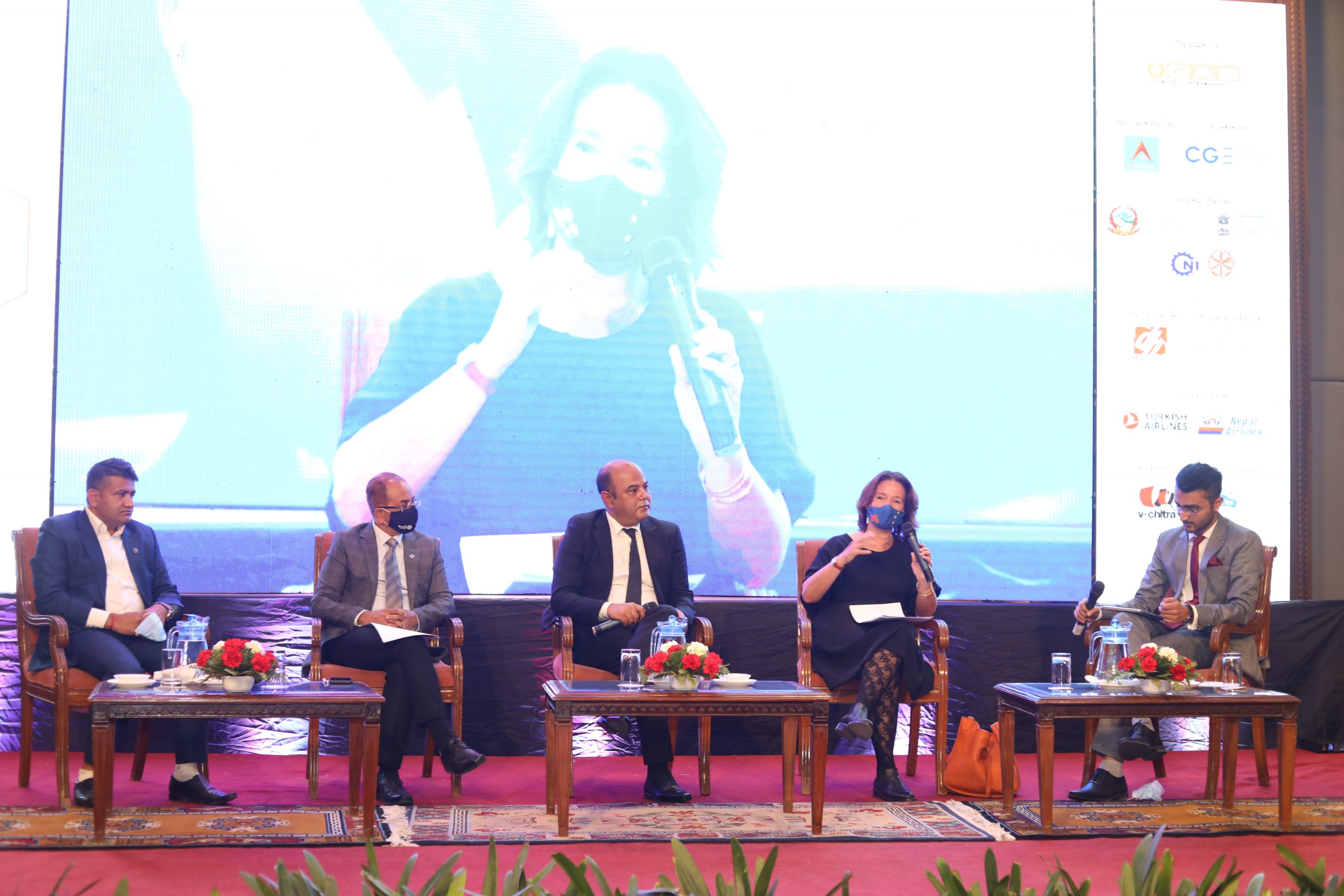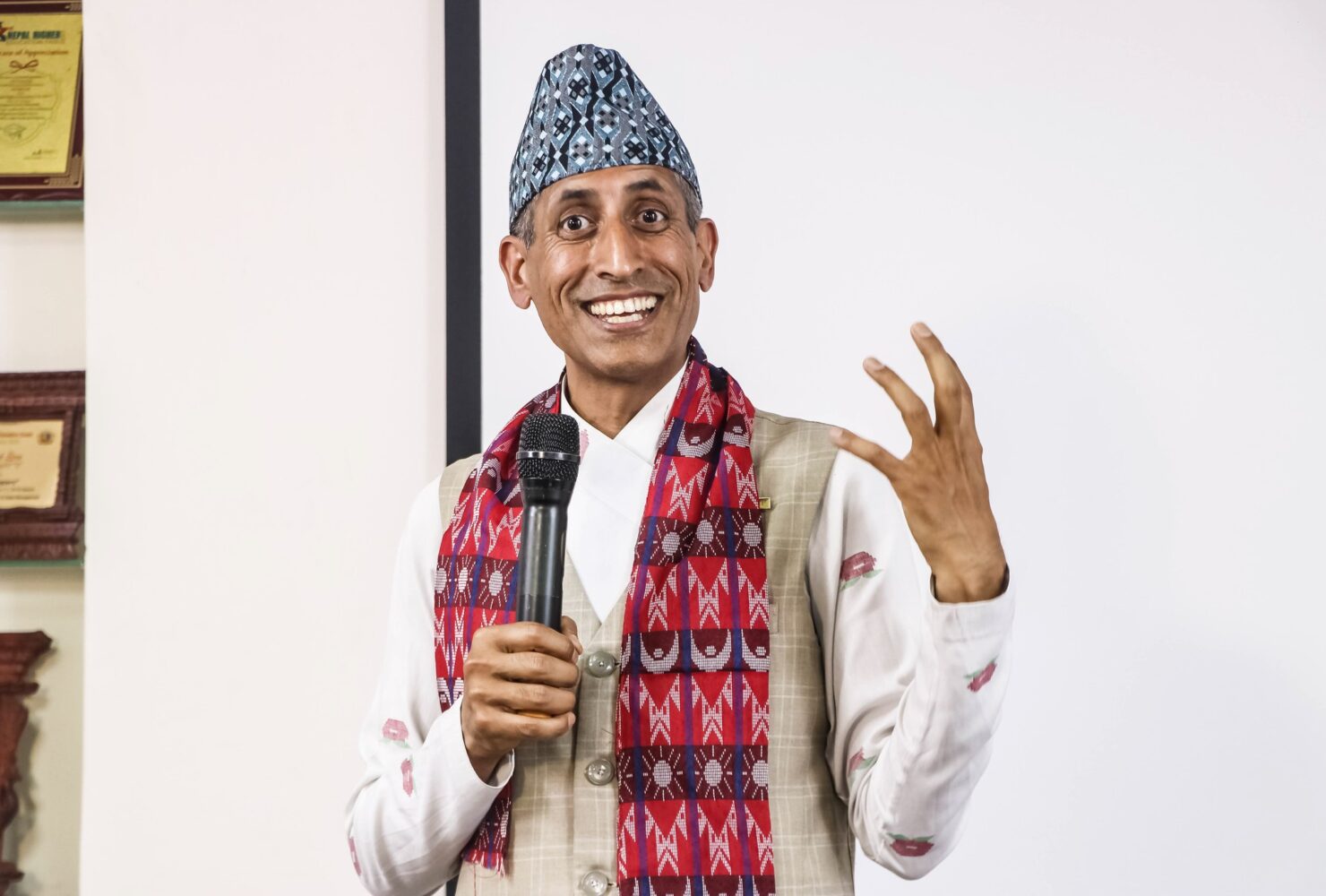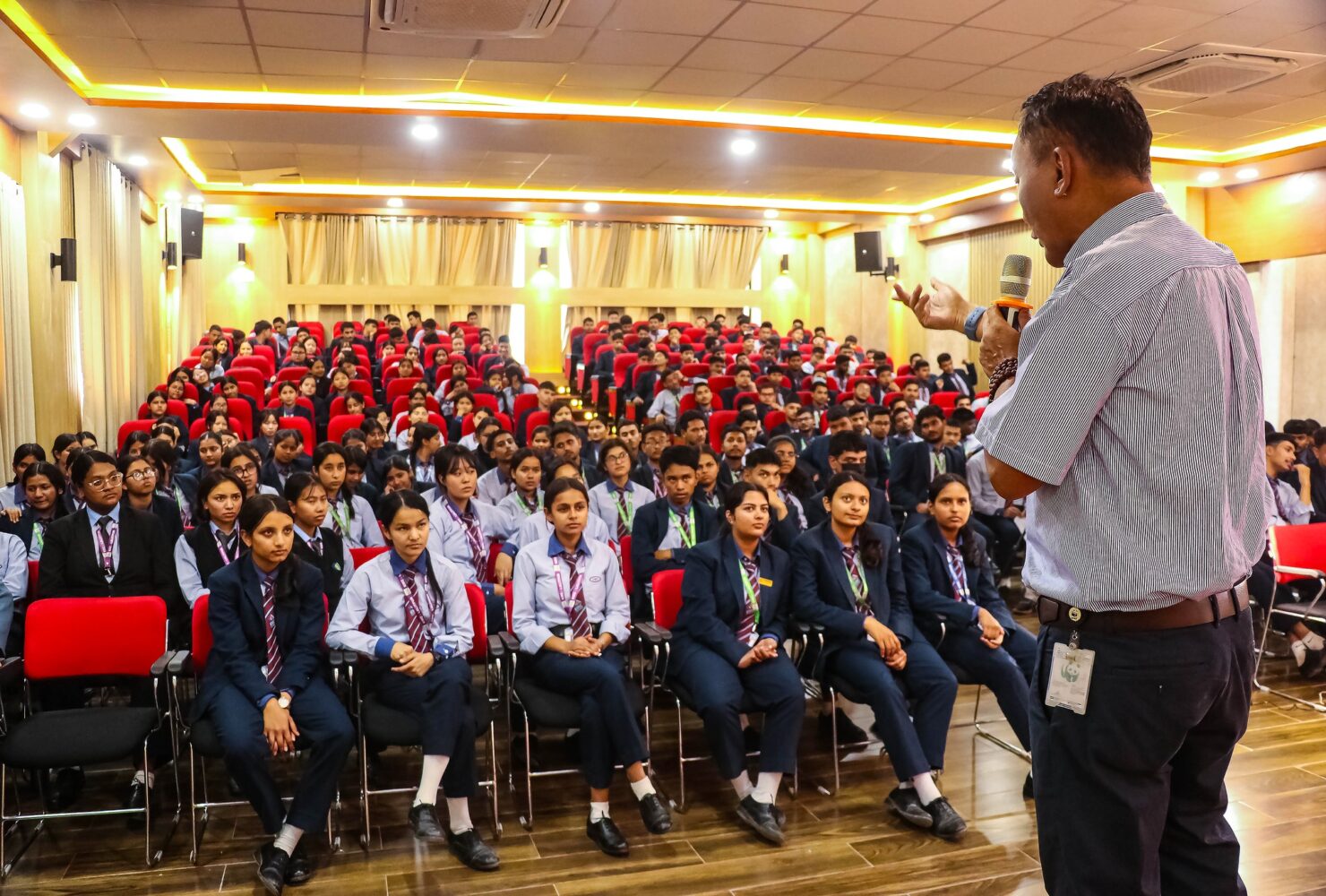CEO Unplugged is a yearly forum organized by Glocal Pvt. Ltd. comprising a series of panel discussions to establish a forum to discuss contemporary business challenges, opportunities, and futuristic views with a sight of experiential learning to the newcomers in the business and students with an objective “Today Meets Tomorrow”.
CEO Unplugged’s first panel conversed on the topic of ‘Workforce Upskilling & Reskilling’. The main goal of the panel discussion was to highlight the need for businesses today to provide substantial upskilling and reskilling options if they are to retain their top talent.
The participating panelists were:
- Mr. Birendra Raj Pandey, Vice-President, Confederation of Nepalese Industries (CNI);
- Mr. Cabinet Shrestha, Managing Director, Agni Incorporated Pvt. Ltd;
- Mr. Laxman Neupane, Chairman/MD, Siddhartha Business Group of Hospitality;
- H.E. Ms. Nona Deprez, Ambassador, Delegation of the European Union in Nepal;
The panel discussion was moderated by Mr. Asish Thakur, Executive Director at Glocal Pvt. Ltd.
Here is the gist of the discussion;
With an engaging ambience, the final panel showcased a single thing that a person requires to move forward and succeed in life, i.e. skills. The whole thought of the panel was laid by the idea that highlighted reskilling and upskilling are both important tools for closing the skills gap in today’s technology workforce. Adding more, the value of education is essential in life but the value of skills is much-needed at the uppermost.
Mr. Thakur interrogated these amazing veteran entrepreneurs about how a workforce of upskilling and rescaling is important. He asked them the possible roles of making a better organization or making a better platform by using the skills and putting forward the resources together.
The speakers of the panel focused their discussions on the importance of youth upskilling and reskilling initiatives in order to enhance employee engagement and retention, recruit new talent, improve departmental coordination, and accelerate the adoption of new trends in any sector.
Similarly, the first question was raised to Mr. Shrestha, “What are the problems you have been finding when you are hiring young people in your renowned organization?”
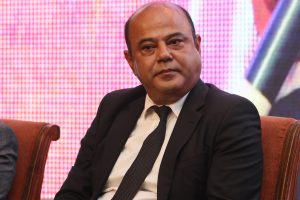
Mr. Cabinet Shrestha: He shared-“ Mainly when you’re starting up, most of the young people are very smart. But in terms of knowledge, there is a lack of experience. But what we do is we do the reverse. We tried to hire younger and inexperienced people. In Particular, we induce one induction period, we train them well in a good way. And I think it’s been well done.”
So, the same question was raised to Mr. Pandey, “What kind of problems are there in your construction business?”
Mr. Birendra Raj Pandey: Mr. Pandey rightfully explained – “When we hire younger or graduates; they graduate from the university and the subjects taught in the university don’t reflect 100% of what we need in the industry.”
For example, if an engineering customer comes to a site. If they are involved in various stakeholders like consulting, architects and engineers. They’ll have problems dealing with understanding the language. And those little things we train them again and again, maybe six months or even a year.
According to the aforementioned answers from both the panelists, Mr. Laxman Neupane rightly explained his points on a practical basis. He mentioned practical knowledge is more important than having certificates. We are doing a lot in terms of getting somebody pressured and then training them and making them into it right.
Moderator: How do you feel about the skilling ecosystem right now through the minimal interactions that you have had in the past few days or last few months? What do you feel is the problem in terms of hiring and skilling the ecosystem in Nepal?
H.E. Ms. Nona Deprez: Thanks a lot and thanks for having me here and good to see you all. I would say this is not an order-specific issue in Nepal. This is the same issue everywhere in the world. I think critical thinking, being creative, being an active learner is the major theme in today’s skilling ecosystem. It has been providing a lot of training to young employees. I think that is very much needed in whatever job and in whatever country. And I think this is something that you can learn, but it’s also something that you have to just entirely arise in everything you do in all of your actions.
Moderator: In terms of a configuration itself, and in terms of particular businesses in automobiles, construction, and also in hospitality. But as a totality, what kind of responses to these problems are being taken care of, or are they in the plans to be taken care of by CNI?
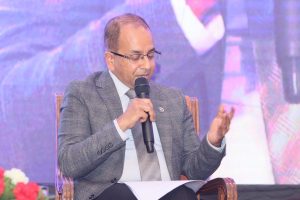
Mr. Birendra Raj Pandey: CNI as being the umbrella organization of medium and large industries. Our members have to say they are struggling to find good people who expect records from every country. So realizing that we recently started working with a European Union project. For the first time, they stripped the bar, five leading employers, associations, NCCICNI, CCSI, and Associates. They’ve started working on establishing employment in the security area and also working on our classification standards of skills, and labor market information system. So, that is the initial stepping stone for the employers to say that we need these kinds of future events in a harmonized and structured way. Meanwhile, it can be taken forward in a sustainable manner in the years to come. So, this one very important task.
And also with some other agencies were trying to set up this self. Having a knowledge report because it reads, whatever has been discussed and studied in housing, and also Standards and Training Centre and apprentices in our initiatives that we will be taking, and also a personal level of education, science and technology is working on the debate on a sector plan.
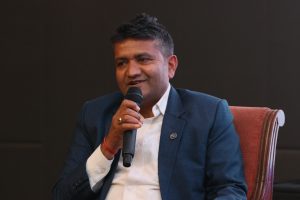
Mr. Thakur beautifully pointed to the term, “apprenticeship”. Adding some light, he mentioned, it is very important to know why an apprenticeship is needed and what it is exactly. We have been working and studying in an environment where we have covered the four walls, study for the full time, and then we go to the open grounds and start doing the job. That’s where the problem lies. And this problem will only be fulfilled right away as not a problem but the solution to this problem is an apprenticeship, so we get to the work, and learn while working. So there is the segment of learning, and that is also held in learning by doing. So, that is something which is very much important to put forward. While we are discussing all these upskilling and reskilling is very much important to get into internships, it is very much important to get into jobs for experiencing the job, not just earning, but at least we need to first get into understanding the job, what you are passionate about and understanding what we need to do ahead. So, with the same node, Mr. Neupane added that Sky is limited, there can be changes and things can be done in Nepal as well. There is no need that we pick up a third citizen somewhere else.
Moderator: What kind of scaling reforms are being done outside, and because of this global things are being changed, new techniques are coming. What do you suggest from the thought processes of abroad that you have seen and what would be the best practices replicated here?

H.E. Ms. Nona Deprez: Thank you. I just wanted to come back on, on what was said before by our panelists. I think what is being done already now in Nepal is very important, it’s very important to underline the importance of the public and private sector partnership, I think it’s very important that public sector and private sector join forces to make sure that the goods that are developed really suits the needs of the employers. And then there two transitions and revolutions that we are all facing in the world, it is the green transition and the digital transition. So we also need to make sure that the skills that are being provided to the young people but also to the older people because they need to keep on working to contribute sustainable development so that we create green jobs. And we are able to embrace the digital revolution, so both have to go hand in hand.
The EU believes very strongly in the fact that green recovery can go hand in hand with job creation. We’ve had economic development in the EU, and that has been accompanied by a decrease in emissions of greenhouse gas. So I don’t think you’re in here but you are very conscious of being vulnerable to climate change or losing biodiversity. So what is being done here by the employers, together with the public sector is to make sure that green jobs can be created, and then we can all contribute to sustainable and inclusive, and resilient recovery from COVID. So I think that’s very important. Just a few words on this apprenticeship, because I think that’s very important too. And I think that’s an area where we can share the experiences and exchange to see whether that is something that could fit the environment here in Nepal.
Moderator: When you hire somebody what do you see first?
Mr. Cabinet Shrestha: I think basically, we look for confidence, creativity, we don’t totally go with what is on the CV. I think that is the wrong way to go.
I would like to enforce what Laxman Ji said i.e. the fastest way to become a millionaire is definitely in Nepal. You just have to be slightly different and a little creative. And you can be given a bunch of anatomical data. We’ve seen it all the time. So it’s very well possible.
Mr. Thakur said that education is needed but the most important thing is to be skilled, and we need to focus on that. So, rightly pointed out all these things; he figured out sometimes we generalize a skill at just machinery, the labour-intensive work. That’s not just a skill. Skill is everything the way we say, the way we talk, the way we work, everything is a skill. He added a question to Mr. Pandey, In Nepal, how does it support it?
Mr. Pandey answered his thoughts in an interesting way. He shared his working experience from the year of 2006 to 2011 in a construction company, Australia. It was a great experience contributing to the Australian economy, and working for them. He added, “After coming back, I started running my family business, and half the time I give to my company and invest with CNI and other social organizations”. We’re spending about $4 billion a year, and we need to spend $20 billion a year just to meet our goals and targets. So there are big opportunities here in Nepal. The only thing is, we need to be a team player and promote our own economy and our own industry. So with this CNI has started to make in Nepal- “Swadeshi Campaign” with an aim to bring 1,000 industries into operation every year.
Under the campaign, the CNI aims to create 1.5 million industrial jobs every year and increase the annual exports worth Rs 4.3 billion over the next five years. Through the campaign, it will contribute 22 percent to the country’s gross domestic product (GDP) by 2025 and 26 percent by 2030. The tagline for the campaign is ‘Our goods, our self-esteem’.
Moderator: Skills are provided in Nepal. Does that help to become a millionaire in Nepal?
Mr. Cabinet Shrestha: Okay. Just simple logic of networking, in terms of Nepal. I think if you look at anybody’s phone, they’ll have at least 500 contacts. And above that is not going to happen anywhere else in the world. So, just see them for what you know and people have, you know you could be talking to a person on the street and they tend to tell you that way we were very fortunate, and networking is rigged works in Nepal.
H.E. Ms. Nona Deprez: I just wanted to comment on what you have just been saying and fully agree. I think the important notion is giving back to your society. I think this is also something that consumers will find more and more important than when they consume when they win to consume responsibly. In Nepal, all the policies become more conducive to gender equality and diversity. I think Nepal enjoys a good and very positive reputation abroad. Not all of your products. You can really have niche products like, if you look at the coffee, it’s a high-quality product you can sell for money because it comes from Nepal. All of that is very appealing and can be even better marketed. It needs to be green, it needs to continue to be environmentally beautiful.
Audience Questions:
In the context of Nepal, how can we promote the notion of giving back to society, from a very young age? What can be the solution to this need in terms of Nepal?
H.E. Ms. Nona Deprez: I’ve been very encouraged to see many young people, young entrepreneurs who want to give back to society who work on sustainable development, who work on diversity, who are really happy that they have gone abroad and bring back the skills for shaping Nepal. I think many entrepreneurs and employees have gone abroad and have come back, but also those who have stayed here want to give back to society and I think this is also a global movement and very much appreciated by citizens as consumers.
The EU has also been supporting the Government of Nepal on primary education and secondary education on improving the quality of education and also improving access to education. I think we’re now working with the Government of Nepal on the next education plan where these kinds of things should be included in learning. The importance of taking care of the environment, learning about diversity, learning about gender equality, all of those things are important. So it is also just for the sake of such a society that is resilient and inclusive.
Moderator: Why should we be more with the same quality product under the action?
Mr. Birendra Raj Pandey: Still industries are struggling to be competitive. Without further labor, the productivity rate is almost at the bottom. That’s why a lot of places like CNI are working hard with the government to reduce the cost of doing business and to become more productive and competitive.
Delivery garments have taken the lead supplies sustained. There’s a lot of growing demand for Nepali garments, people started realizing the Liberty garments are good quality.
H.E. Ms. Nona Deprez: We should work on trying to increase the value change and add more value in each of the value changes to make sure that it really makes sense to produce in Nepal. And another revolution that would come up is natural capital accounting, where if we internalize the cost of a product, the cost of the production and the cost of the transport would be lesser price between the new value products and the Bangladeshi products. So I think that is also a very important way of looking at an accounting system.
Moderator: What kind of reforms are needed from the employer’s perspective in terms of putting more action to the world and making these changes more relevant?
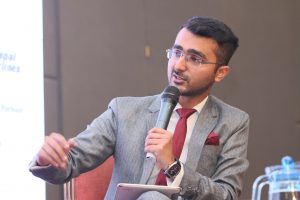
Mr. Cabinet Shrestha: We are trying to put forward an environment of business in industries at all levels, policy-level implementation level in our skill Testing Certification like the establishment of sector skill councils is kind of autonomous. And then dictate all curriculums that are needed to give the inputs, a non-profit base area is the labor market information system. And also, the training providers need to know what kind of skills and competencies are needed for the industry so there has to be a structure of giving inputs to providers in terms of career development. Workplace-based learning and competency-based learning are very important.
H.E. Ms. Nona Deprez: I fully agree with what has been said, public, private partnership with the private sector, business associations with the chamber of commerce with academia, and with training institutes. And then, of course, we work very closely with TNI and other business associations for the British Council to support the act.
Moderator: You were talking about cloud computing, AI and all your things and these things are really coming up. Whatever skills that we have are of no use right now, or how do we make it much better?
Mr. Cabinet Shrestha: The skills that we have, we are upskilling every day because technology is technically advanced in everything. So, other things, with the resources that you have to upskill yourself are going through constant learning. Constant learning is about the constant expansion of skills and skill-sets through learning and increasing knowledge. If you have the support of the podcaster, YouTube, books, or anything which helps to enhance your learning easily.
Thus, Continuous learning is the self-motivated persistence in acquiring knowledge and competencies in order to expand your skills set and develop future opportunities.
The final question raised in the discussion was, “What should young people do to be a better person or get better opportunities?”
Mr. Pandey urged being young graduates, we need to watch out for the emerging trends. Things are changing very rapidly. This globalized world self-service can be very careful not to consciously intend to change. And then we need to be close to industries and businesses during studies, as well.
Ms. Deprez mentioned that always believe in yourself and your competence because the world is changing very fast. So, being critical, thinking out of the box, and having an open mind and problem solving, will help you.
Lastly, Mr. Thakur ended the panel discussion with a great message, “Any skill that will bring respect to you. And with that respect what we need to do is we need to respect all the skills that are there.”
Conclusion
The panel discussion was able to focus on the drivers of workforce reskilling, upskilling, and ways of giving back to our society as a youth, as well as leaders of the policy to support a skill-based economy and so on. It was indeed an intense yet powerful discussion.

